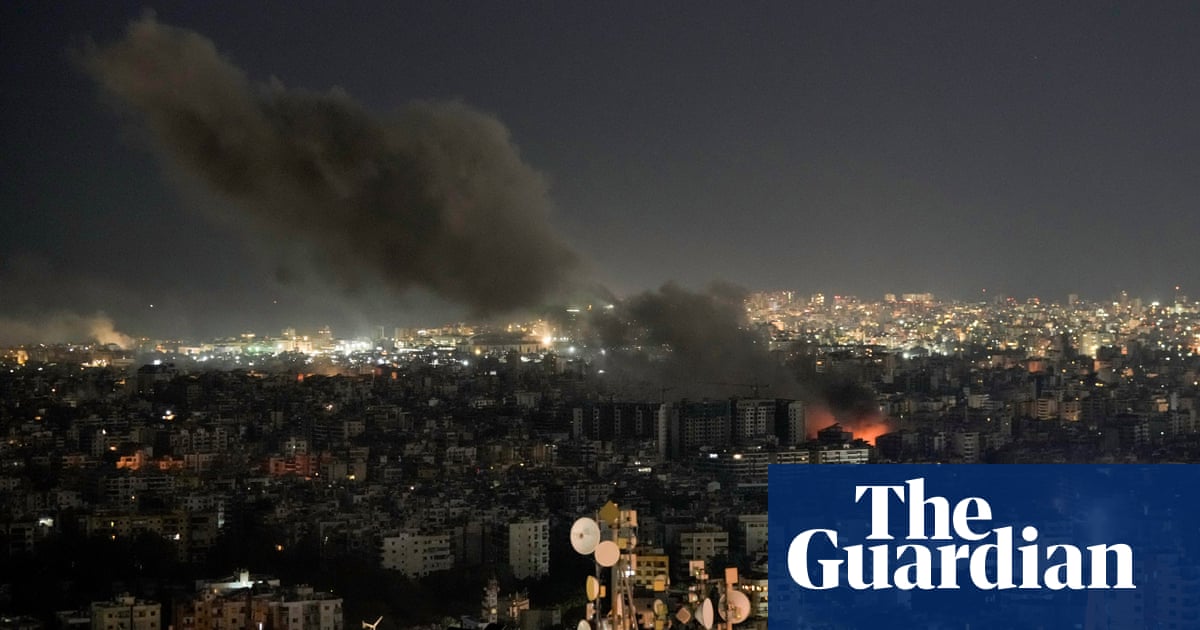Israel has accused Hezbollah of keeping hundreds of millions of dollars in cash and gold in a bunker under a hospital in the southern suburbs of Beirut, though it said it would not strike the complex.
The Sahel hospital in Dahiyeh was evacuated shortly afterwards, and Fadi Alame, its director, told Reuters that the allegations were untrue.
Israel did not provide evidence for its claim that cash was being kept under the hospital. Instead, it published an animated graphic that purported to show a bunker under the hospital and said it had previously been used to hide the former secretary general of Hezbollah, Hassan Nasrallah. Israel appealed to the Lebanese government to confiscate the money it said the Shia militant organisation had stolen from the Lebanese people.
Shortly after, Israel issued a series of warnings to residents of Dahiyeh that it would begin striking buildings in the area and that they should move at least 500 metres away. Those who remained in the area began to flee.
Airstrikes began about an hour later, with strong explosions heard across the Beirut area. One of the strikes hit just in front of the entrance of the Rafik Hariri university hospital, the largest public hospital in Lebanon. At least four people including a child were killed and 24 injured in the strike, and the hospital suffered “major damage” from the blast.
Despite the strike, the hospital’s activities continued as usual and it was receiving the injured from Monday night’s strikes, according to a source at the hospital.
The initial casualty count was expected to rise as first responders continued digging through the rubble for people. A picture of the building struck in front of Rafik Hairi hospital showed a man covered in blood lying lifeless in a bombed-out building.
Fears had proliferated that hospitals would be struck in the greater Beirut area after the Israeli allegations, which echoed similar claims in Gaza, where the Israel Defense Forces said Hamas ran military operations from medical buildings.
Lebanon’s ministry of health condemned what it said was “attacks on two of Lebanon’s largest hospitals” and part of Israel’s “daily targeting of the Lebanese health sector”. Israel has killed at least 115 healthcare workers and emergency responders since fighting started between Hezbollah and Israel a year before.
It was the second night in a row that Beirut was heavily bombed, with Israel carrying out more than 15 airstrikes on Hezbollah-linked banking institutions the night before.
On Sunday night, Israel said that it would begin targeting a Hezbollah-affiliated bank, Al-Qard Al-Hassan, which provides interest-free loans and banking services to hundreds of thousands of Lebanese – primarily Shia Muslims. It accused the bank of helping finance Hezbollah and said that its branches were used to store weapons.
The announcement that Israel would start targeting the bank, a part of Hezbollah’s civilian institutions, signified an expansion of the scope of Israel’s targets from just the group’s military wing. The institution had sanctions placed on it by the US in 2017 during the Trump administration for giving Hezbollah access to the international financial system, according to the US Treasury.
Al-Qard Al-Hassan was founded in the early 1980s as a charitable institution, part of Hezbollah’s robust social services network.
after newsletter promotion
The banking institution became more popular after Lebanon’s 2019 financial crisis, when commercial banks froze almost all accounts and almost entirely stopped issuing loans. Hundreds of thousands of Lebanese people, primarily Shia Muslims, bank with Al-Qard Al-Hassan, many of them giving the bank familial assets such as gold in exchange for loans.
Shortly after saying it would begin striking Al-Qard Al-Hassan, Israel began striking buildings belonging to the bank in greater Beirut, southern Lebanon and the Bekaa valley.
At least 10 airstrikes were carried out in Dahiyeh, causing an entire building to collapse and a jet of fire to stream into the air in the Chiyah neighbourhood. A building close to Lebanon’s only commercial airport was also struck – video footage showed a smoke plume billowing while a nearby plane sat on the runway.
“They struck empty buildings in residential neighbourhoods, and destroyed those surrounding neighbourhoods. These weren’t military centres or weapons caches,” said Ma’an Khalil, the mayor of Ghobeiry municipality in the southern suburbs of Beirut.
The US envoy Amos Hochstein arrived in Beirut on Monday morning, where he met Lebanon’s parliamentary speaker, Nabih Berri, and the country’s caretaker prime minister, Najib Mikati, to discuss ways towards a ceasefire.
Hochstein said implementation of the UN security council resolution 1701 was the path towards a ceasefire in Lebanon and rejected calls to amend the UN agreement.
Resolution 1701 ended the 2006 Israel-Hezbollah war and has since been the framework that governs security dynamics on the Lebanese-Israeli boundary. Under the terms of the agreement, Hezbollah and other armed militias must not be present past the Litani River, about 18 miles (30km) north of the border. The resolution also dictated that Israeli forces withdraw from Lebanon.

